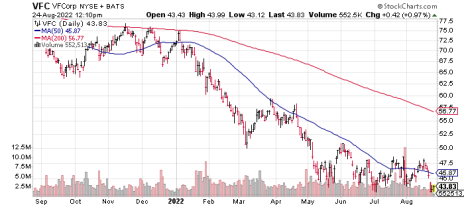VF Corporation (VFC) is a not-well-known company that makes many well-known brands of apparel including The North Face, Timberland, Vans and Dickies. The company was founded in 1899 in Pennsylvania as a glove and mitten maker, then later changed its name to Vanity Fair Silk Mills when it expanded into lingerie. In 1969, the company became the VF Corporation as its acquisition strategy led it to become more of a portfolio of brands. This approach initially was marginally productive, until 2004 when then-CEO Mackey McDonald launched a more aggressive strategy to grow the apparel stock “by building lifestyle brands that excite consumers around the world.”
This new strategy was immensely successful. Riding the popularity of its rapidly expanding roster of acquired brands and helped by the growth of the casual work attire trend, VF’s revenues nearly tripled from 2002 to 2019 and income from continuing operations increased 3.5 times. Enthusiastic investors drove the stock up even faster: between 2002 and their peak in late 2019, the apparel stock rose over 10x. The S&P 500, by comparison, gained only about 3.7x during that period. It would have seemed that the company had found the golden ticket to success.
[text_ad]
However, VF’s share price has fallen nearly 45% from their peak and now trade at their mid-2013 price. And, the stock offers an appealing 4.6% dividend yield. Are the shares attractive here?
Not quite yet.
VF’s previously impressive strategy has run into some difficulties. A major problem is sprawl. Its vast portfolio covered dozens of brands, which it had to combine into segments including Outdoor, Active, Work and Jeans. Managing this scale of brands easily leads to inefficiencies and weak performance. The company acknowledged this issue when it spun off Kontoor Brands (including Lee, Wrangler and other jeans brands and the outlet stores) in 2019 and sold its Occupational Workwear brands in 2021. And, the company has all but stopped its acquisition program since acquiring Supreme in 2020.
Another issue is VF Corporation’s debt burden. Acquisition-driven strategies are capital-intensive, and VF Corp’s balance sheet reflects this strain. The company currently has $5.3 billion in total debt, which is over 2.8x its expected EBITDA. While not overwhelming, the leverage limits the company’s ability to undertake further acquisitions. The company’s $528 million in cash on hand is likely unavailable for any use other than providing necessary liquidity. The Supreme brand deal cost $2.1 billion – VF is unlikely to be able to complete another deal of that size for years. Adding more pressure to its finances is the high price that VF paid for Supreme, at over 4x revenues and 27x earnings. Accumulating debt to pay for expensive deals isn’t likely a winning or sustainable strategy.
One risk for any portfolio is weak performance by a major component. At VF, the Vans brand comprises 35% of total revenues but is struggling with growth and now is essentially in “turnaround” status.
Other secular and near-term issues weigh on VF: competition is intensifying, consumer trends may be shortening, the company’s major brands may have reached saturation, cost pressures remain elevated, retailers have a glut of inventory, and the pandemic may have permanently shifted consumers preferences to online from physical stores
So, the fundamentals remain uninspiring.
VF’s share valuation isn’t a bargain, either. At 15x earnings and 12.6x EV/EBITDA, we consider the valuation of this apparel stock to be about fair rather than cheap. The dividend is clearly appealing at about twice the market’s yield. But, the dividend consumes most of the company’s free cash flow, leaving little room for disruptions or other cash pressures.
What stocks do we like more than VF Corp shares? At the Cabot Undervalued Stocks Advisory and theCabot Turnaround Letter, we help investors navigate the equity markets using a common-sense, value-oriented approach that emphasizes out-of-favor stocks of companies with real value. Let us help you sort through the market to find them.
[author_ad]


